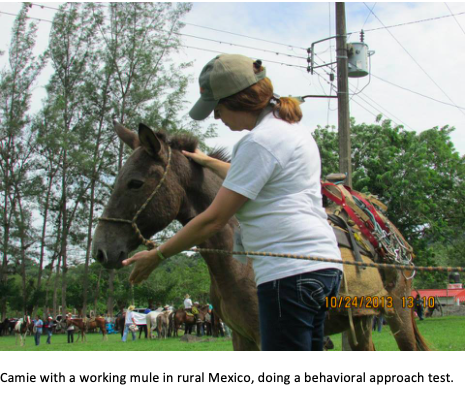April 29, 2019 | by Aly Tweedle and Dani Rose, BBRM Equine Management students
Empirical evidence has contributed to position statements endorsed by ISES with the goal to improve horse welfare
 It is every horse girl or boy’s dream: growing up on a horse farm. For most, a dream is all it is, but for Dr. Camie Heleski, that dream was reality. She spent her childhood on her family’s horse farm where they raised, trained, and showed horses. Given this history, it is no surprise that Heleski went on to pursue a career deeply involved with horses.
It is every horse girl or boy’s dream: growing up on a horse farm. For most, a dream is all it is, but for Dr. Camie Heleski, that dream was reality. She spent her childhood on her family’s horse farm where they raised, trained, and showed horses. Given this history, it is no surprise that Heleski went on to pursue a career deeply involved with horses.
Upon completion of her B.Sc. in Animal Science from Michigan State University, Heleski knew her educational journey was not yet over. She continued on at MSU to receive a Master’s degree with an emphasis on equine nutrition and exercise physiology, and a PhD focusing on equine behaviour and welfare.
 Deeply ingrained in the equine program at Michigan State, Heleski continued as Coordinator of their two-year Horse Management Program for 25 years. Recently, in 2016, Heleski began teaching and advising at the University of Kentucky in their Equine Science and Management program. In addition to teaching, she is highly involved in equine research. Her applied research interests have revolved around equine behaviour and welfare, horse-human interactions and working equids in developing regions of the world; more recently she has begun examining issues related to the Thoroughbred racing industry.
Deeply ingrained in the equine program at Michigan State, Heleski continued as Coordinator of their two-year Horse Management Program for 25 years. Recently, in 2016, Heleski began teaching and advising at the University of Kentucky in their Equine Science and Management program. In addition to teaching, she is highly involved in equine research. Her applied research interests have revolved around equine behaviour and welfare, horse-human interactions and working equids in developing regions of the world; more recently she has begun examining issues related to the Thoroughbred racing industry.
In addition to her teaching and research, she has been actively involved with the International Society for Equitation Science (ISES) as a Council member and currently serves as their Senior Vice President. As one of the keynote speakers at this year’s ISES conference being held in Guelph, ON from August 19-21, Heleski will be tracing the roots of equitation science from the shared idea between a small group of likeminded individuals in 2002 to the birth of the official academic society. Heleski will explore themes from past conferences and highlight the impact such research has made to the management, training and understanding of horses. For example, the development of technologies such as saddle pressure mats and rein tensiometers together with behavioural indicators such as the pain grimace scale and eye temperature allow us to manage the effects of riding and training on the horse. Empirical evidence has contributed to position statements endorsed by ISES with the goal to improve horse welfare.
In her spare time, she enjoys riding her Arabian gelding in the discipline of dressage. Heleski and her daughter have also recently adopted an Off the Track Thoroughbred named Abu by More than Ready out of a Malibu Moon daughter.
Registration is now open for the 15th annual ISES conference. Don’t miss the early bird deadline of June 1 for conference registration. For all the details and links to registration and accommodations, visit the Equitation Science website or the Horse Portal.
ISES 2019 Sponsors
Organizing Sponsors
Maple Leaf Sponsor










